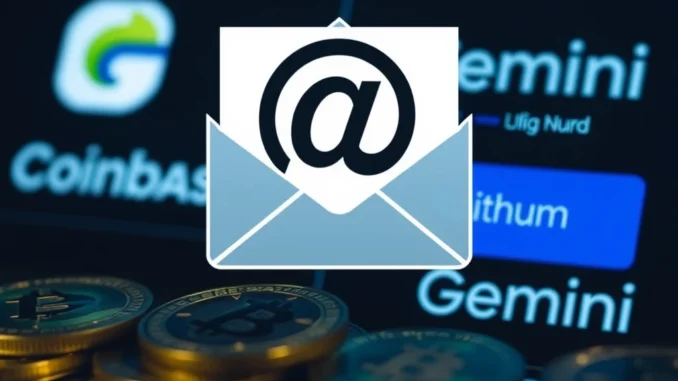
Are you a cryptocurrency user? Then you need to pay close attention! A worrying trend is emerging in the crypto space: crypto scams are on the rise, specifically targeting users of popular exchanges like Coinbase and Gemini. Imagine receiving an email that looks legitimate, seemingly from your trusted crypto exchange, urging you to take immediate action to secure your funds. Sounds concerning, right? It is!
Rising Tide of Coinbase and Gemini Impersonation Scams
According to recent reports from Cointelegraph, cybercriminals are increasingly deploying sophisticated phishing emails that cleverly mimic communications from Coinbase and Gemini. These aren’t your typical, easily detectable scam attempts. These emails are designed to appear authentic, using familiar logos, branding, and even language that you might associate with these reputable exchanges. The goal? To trick you into divulging your sensitive information and ultimately steal your cryptocurrency.
But how exactly do these Coinbase scams and Gemini scams work? Let’s break down their tactics:
- The Self-Custody Wallet Ploy: A central theme in these scam emails is the urgent need for users to switch to ‘self-customized wallets’. They often provide seemingly straightforward instructions on how to download a ‘Coinbase wallet’ (which is likely a fake or malicious wallet).
- Pre-Generated Recovery Phrases: This is a major red flag! The emails may offer pre-generated recovery phrases, promising an easy way to set up this new wallet. Never, ever use recovery phrases provided in emails! Legitimate wallets generate unique phrases for each user. Using a pre-generated phrase is like handing over the keys to your crypto vault to scammers.
- The Class Action Lie: To add a layer of urgency and fear, these emails falsely claim that Coinbase (and similarly Gemini in other scams) is facing a class action lawsuit related to selling unregistered securities. This fabricated legal issue is used to panic users into taking immediate action – exactly what the scammers want.
- Urgent Call to Action: The emails are designed to create a sense of urgency. They pressure you to act quickly to ‘protect’ your assets by moving them to this ‘secure’ self-custody wallet. This urgency can cloud your judgment and make you more likely to fall for the scam.
The Devastating Consequences of Falling for Crypto Phishing
What happens if you fall victim to these crypto phishing emails? The consequences can be devastating:
- Loss of Funds: If you use the pre-generated recovery phrase to set up a new wallet and transfer your cryptocurrency, you are essentially transferring your assets directly into the scammer’s wallet. Your funds will be stolen, and recovering them is often extremely difficult, if not impossible.
- Compromised Personal Information: In some cases, these scams might also attempt to steal your login credentials or other personal information, which can be used for further malicious activities.
- Emotional Distress: Beyond the financial loss, being a victim of a scam can be emotionally distressing, eroding trust in the digital space.
How to Spot and Avoid These Deceptive Crypto Scams?
Protecting yourself from these crypto wallet security threats is crucial. Here are actionable steps you can take to stay safe:
- Verify the Sender: Always scrutinize the sender’s email address. Legitimate emails from Coinbase and Gemini will come from official domain names (e.g., @coinbase.com, @gemini.com). Be wary of emails from addresses that look slightly off or use generic domains (like @gmail.com, @yahoo.com).
- Don’t Click on Links in Suspicious Emails: Avoid clicking on any links embedded in emails that raise suspicion. Instead, manually type the exchange’s official website address directly into your browser.
- Never Share Recovery Phrases: Legitimate cryptocurrency exchanges will NEVER ask for your recovery phrase via email or any other unsolicited communication. Your recovery phrase is your private key – keep it secret and secure.
- Be Skeptical of Urgent Requests: Scammers thrive on creating a sense of urgency. Take a moment to pause, breathe, and critically evaluate any email that demands immediate action regarding your crypto assets.
- Enable Two-Factor Authentication (2FA): Always enable 2FA on your exchange accounts for an added layer of security.
- Educate Yourself: Stay informed about the latest scam tactics. Reputable crypto news sources (like Cointelegraph itself!) and exchange blogs often publish security alerts and educational content.
Staying Vigilant in the Crypto World
The rise of Coinbase scams and Gemini scams highlights the constant need for vigilance in the cryptocurrency space. As the industry grows, so does the sophistication of cybercriminals. By understanding their tactics, staying informed, and practicing safe online habits, you can significantly reduce your risk of becoming a victim. Remember, your crypto wallet security is in your hands. Always be cautious, double-check information, and when in doubt, err on the side of caution. Protect your digital assets – your financial future depends on it!



